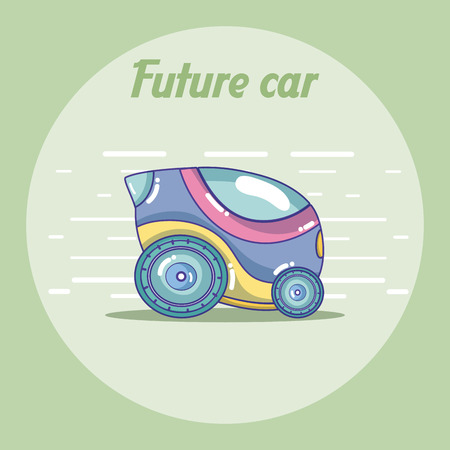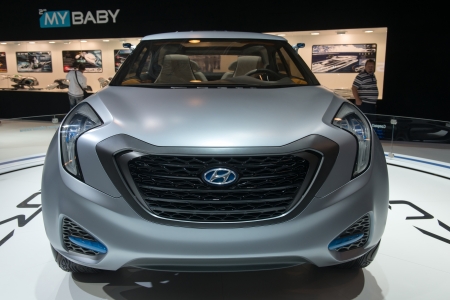1. Introduction to Car Shows and Their Importance
Car shows play a vital role in the automotive industry by serving as platforms where automakers, designers, and technology developers come together to showcase their latest innovations. These events attract industry professionals, media, and car enthusiasts, offering a glimpse into the future of mobility.
What Are Car Shows?
Car shows are organized events where auto manufacturers present new models, concept cars, and advancements in vehicle technology. Ranging from small regional exhibitions to global trade shows, these events influence industry trends and consumer preferences.
The Significance of Car Shows
Car shows are more than just exhibitions; they help shape the automotive landscape in multiple ways:
- Innovation Showcase: Automakers unveil cutting-edge technology, such as electric vehicles (EVs), autonomous driving systems, and advanced safety features.
- Market Trends: Industry experts analyze car shows to predict upcoming trends, consumer demands, and potential disruptions in the market.
- Networking Hub: These events provide opportunities for manufacturers, suppliers, and potential buyers to connect and explore future collaborations.
How Car Shows Present New Technologies and Designs
Car shows serve as a launchpad for revolutionary vehicle designs and tech advancements. Automakers often introduce concept cars that showcase futuristic styling and innovative engineering. Some of the key technological highlights at car shows include:
| Technology | Impact on the Industry |
|---|---|
| Electric Vehicles (EVs) | Accelerates the shift toward sustainable mobility. |
| Autonomous Driving | Highlights progress in self-driving technology. |
| Advanced Infotainment | Enhances user experience with AI-powered interfaces. |
| Safety Innovations | Introduces new standards in accident prevention. |
Conclusion
Car shows are essential in shaping the automotive industrys future, influencing consumer preferences, and driving technological advancements. By bringing together industry leaders, cars shows create opportunities to showcase new models, explore next-generation technologies, and define the direction of the global automotive landscape.
2. How Car Shows Influence Automotive Trends
Car shows play a crucial role in shaping automotive trends by showcasing the latest innovations in vehicle design, technology, and consumer preferences. Automakers use these events to introduce groundbreaking concepts, test public interest, and set the direction for future vehicle development.
Setting Trends in Vehicle Design
Car shows provide a platform for manufacturers to unveil new design concepts, often influencing the aesthetic direction of upcoming models. From sleek aerodynamic shapes to bold, futuristic styling, these events shape how cars look and feel on the road.
Key Design Trends from Car Shows
| Trend | Description |
|---|---|
| Aerodynamic Shapes | Streamlined, fuel-efficient designs that enhance performance. |
| Minimalistic Interiors | Simplified dashboards with touchscreen controls and fewer physical buttons. |
| Futuristic Lighting | Advanced LED and laser lighting for improved visibility and style. |
Driving Automotive Technology Advancements
Many technological innovations debut at automotive exhibitions, often setting the stage for the next wave of vehicle advancements. Features such as electric powertrains, self-driving capabilities, and AI-assisted driving aids frequently make their first public appearances at major auto shows.
Examples of Tech Innovations Introduced at Car Shows
- Electric and hybrid powertrains that promote eco-friendly driving.
- Autonomous driving features that enhance safety and convenience.
- Connected car technology for seamless smartphone integration.
- Advanced driver-assistance systems (ADAS) with automated features.
Influencing Consumer Preferences
Car shows also help determine what features and styles customers favor. Automakers gauge public reception of new models and concepts, allowing them to refine their offerings before mass production begins.
Ways Auto Shows Shape Consumer Demand
- Interactive Displays: Hands-on experiences let attendees test new features.
- Concept Car Reception: Enthusiastic feedback can lead to production models.
- New Market Trends: Popular themes like electric vehicles or performance cars guide future direction.
Conclusion
Car shows serve as powerful influencers, driving trends that shape future vehicle models. Automakers use these events to unveil cutting-edge designs, test innovative technology, and understand consumer preferences, ultimately defining the next generation of automobiles.

3. Role of Car Shows in Industry Development
Car shows play a crucial role in shaping the automotive industry by driving innovation, fostering partnerships, and expanding market opportunities. These events provide a platform for automakers, suppliers, and tech companies to showcase their latest advancements, collaborate on future projects, and attract new investors.
Fostering Innovation
Auto shows serve as an incubator for new ideas and groundbreaking technologies. Automakers use these events to unveil concept cars, electric vehicles, and autonomous driving systems, setting the stage for the future of transportation. Moreover, manufacturers gather real-time feedback from consumers and industry experts, helping refine their designs and technologies before mass production.
Building Industry Partnerships
Car shows bring together automakers, technology firms, and suppliers under one roof, facilitating valuable partnerships. These collaborations lead to joint ventures, technology-sharing agreements, and supplier contracts that accelerate innovation and production.
Types of Industry Partnerships Formed at Auto Shows
| Partnership Type | Description |
|---|---|
| Automaker & Tech Company | Enables the integration of cutting-edge software, AI-driven features, and autonomous systems. |
| Manufacturer & Supplier | Secures essential parts and components, ensuring a steady production process. |
| Investment & Startups | Helps emerging automotive companies gain funding and visibility. |
Facilitating Market Expansion
Through international car shows, automakers enter new markets and gain exposure to diverse customer bases. These events help brands showcase their vehicles to different demographics, test consumer reception, and refine their market strategies. Additionally, car shows create opportunities for dealerships and distributors to expand their networks globally.
Global Impact of Car Shows
- Introduction of brands to new regions and consumer groups.
- Testing market demand before launching new vehicles.
- Strengthening relationships between automakers and dealers.
By driving innovation, encouraging collaborations, and furthering global market reach, car shows continue to push the automotive industry forward, making them an essential part of the industrys growth and development.
4. Major Car Shows and Their Global Impact
Car shows play a critical role in shaping the automotive industry, serving as platforms for manufacturers to unveil new models, concept vehicles, and cutting-edge technologies. Among the most influential auto shows are the Detroit Auto Show, Geneva Motor Show, and CES. Each of these events has a unique impact on the industry, influencing trends, consumer preferences, and technological advancements.
Detroit Auto Show (NAIAS)
The Detroit Auto Show, officially known as the North American International Auto Show (NAIAS), is one of the most significant automotive events in the United States. Held in the heart of the American auto industry, this show is known for:
- Major automotive debuts from leading U.S. and global brands
- Showcasing future mobility concepts, including electric and autonomous vehicles
- Direct influence on North American car market trends
Geneva Motor Show
The Geneva Motor Show is one of the most prestigious auto shows in the world. Unlike the Detroit Auto Show, which focuses heavily on the U.S. market, Geneva provides a more international perspective. Key features include:
- Unveiling high-end luxury, performance, and exotic cars
- Major platform for European manufacturers
- Emphasis on design, innovation, and environmentally friendly vehicle technology
Consumer Electronics Show (CES)
CES, held annually in Las Vegas, may not be a traditional auto show, but it has become one of the most important events for showcasing automotive technology. It primarily focuses on:
- Advanced driver-assistance systems (ADAS)
- Connected cars and in-car artificial intelligence
- Electric vehicle (EV) innovations from both traditional automakers and startups
Comparison of Major Auto Shows
| Auto Show | Focus | Key Impact |
|---|---|---|
| Detroit Auto Show (NAIAS) | Global car debuts, mobility solutions | Direct influence on U.S. automotive market trends |
| Geneva Motor Show | Luxury vehicles, European manufacturers | Highlights cutting-edge design and innovation |
| CES | Automotive technology, AI, EVs | Showcases the future of smart and electric vehicles |
How These Auto Shows Drive Industry Trends
Each of these major auto shows plays a crucial role in driving industry trends and shaping the future of mobility. From concept car reveals to discussions on sustainability, the impact of these events extends beyond flashy displays—they influence consumer expectations, technological advancements, and even government policies on transportation.
5. Five, The Future of Car Shows in a Digital Age
As technology evolves and consumer behaviors shift, the traditional car show format is undergoing a transformation. Digital advancements, virtual events, and changing audience expectations are shaping the future of automotive expos. Let’s explore how these elements are redefining car shows and what it means for the automotive industry.
The Rise of Virtual and Hybrid Events
Car shows are no longer confined to physical exhibition halls. Many major automotive expos now incorporate virtual or hybrid formats, allowing global audiences to participate without traveling. These formats provide interactive experiences, live-streamed unveilings, and even virtual test drives.
Key Benefits of Virtual and Hybrid Car Shows
| Benefit | Impact |
|---|---|
| Wider Audience Reach | More people can attend from anywhere in the world. |
| Cost Reduction | Exhibitors save on physical booth expenses and logistics. |
| Real-Time Engagement | Live Q&A sessions and interactive displays enhance audience participation. |
| Data-Driven Insights | Digital platforms track user behavior, providing valuable marketing insights. |
How Digital Transformation is Changing Car Show Experiences
Technology is playing a significant role in enhancing automotive expos. From augmented reality (AR) showcases to artificial intelligence (AI)-powered chat assistants, digital tools are revolutionizing how manufacturers present their latest models.
Emerging Digital Innovations
- Augmented Reality (AR): Allows users to visualize cars in their environment through smartphones or headsets.
- AI Chatbots: Provides instant customer support and answers product-related inquiries.
- 3D Virtual Showrooms: Enables attendees to explore vehicles from all angles without being on-site.
Shifting Consumer Behaviors and Expectations
Car buyers today demand more convenience and personalized experiences. Many consumers prefer researching vehicles online before attending an expo, while some may even finalize purchase decisions through digital platforms.
Changing Consumer Trends in Car Expos
| Consumer Behavior | Impact on Car Shows |
|---|---|
| Online Vehicle Research | Automakers must provide extensive digital content and virtual previews. |
| Personalized Experiences | Expo organizers offer tailored interactions based on visitor preferences. |
| Direct-to-Consumer Online Sales | Car brands explore selling vehicles through digital marketplaces. |
What the Future Holds for Automotive Expos
As the industry adapts to digital advancements, car shows will continue evolving to stay relevant. While physical expos will remain important, they will likely complement digital experiences rather than stand alone. The key to success lies in integrating technology with traditional elements to engage modern audiences.


